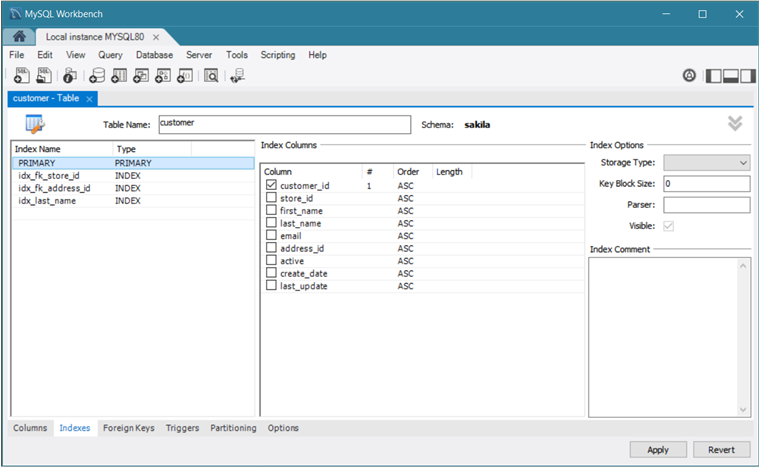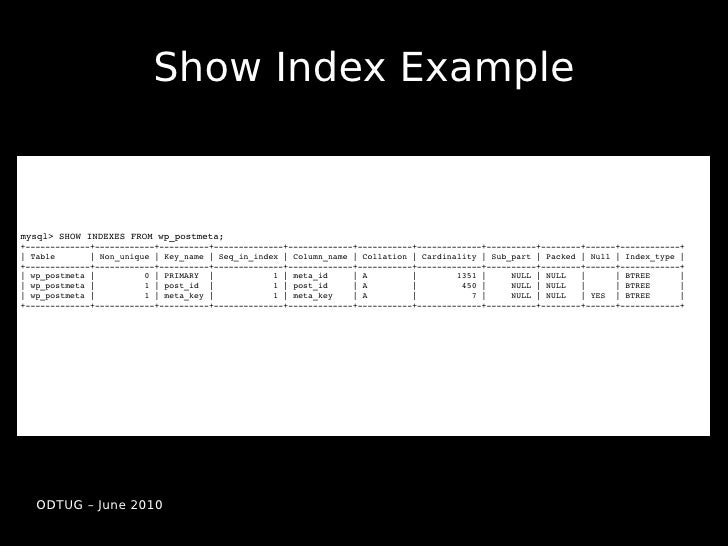
The index method used (BTREE, FULLTEXT, HASH, RTREE). Information about the index not described in its own column, such as disabled if the index is disabled. Any comment provided for the index with a COMMENT attribute when the index was created. Summary: in this tutorial, you will learn how to query index information from a table by using the MySQL SHOW INDEXES command.

Introduction to MySQL SHOW INDEXES command. To see the index for a specific table use SHOW INDEX. You can check your indexes in MySQL workbench. How to show indexes in Oracle SQL - Stack.
Show indexes in MySQL table - Stack. MySQL has a SQL query SHOW INDEX FROM which returns the indexes from a table. In this section, you will learn about MySQL index including creating indexes , removing indexes , listing all indexes of a table and other important features of indexes in MySQL. Creating indexes – introduces you to index concept and show you how to create an index for one or more columns of a table.
Index cardinality refers to the uniqueness of values stored in a specified column within an index. The optional EXTENDED keyword causes the output to include information about hidden indexes that MySQL uses internally and are not accessible by users. There are various forms of MySQL SHOW commands, which provides information about databases, tables, columns, or status information about the commands. If there is a choice between multiple indexes , MySQL normally uses the index that finds the smallest number of rows (the most selective index ). If the table has a multiple-column index , any leftmost prefix of the index can be used by the optimizer to look up rows. Displaying INDEX Information.
To display the INDEX of a table, run SHOW INDEX query with the following syntax. The query displays all the INDEX in rows. There could be one or more INDEX to a table. For example, to show INDEX of students table, we run the following query.
Here’s a little tip for you. In the above picture, you see all the rows like a sentence. It may make more sense if you look at the INFORMATION_SCHEMA table containing indexes (look at documentation).
This MySQL tutorial explains how to create, drop, and rename indexes in MySQL with syntax and examples. An index is a performance-tuning method of allowing faster retrieval of records. An index creates an entry for each value that appears in the indexed columns. The PRIMARY index is special because the index itself is stored together with the data in the same table. The clustered index enforces the order of rows in the table.
Other indexes other than the PRIMARY index are called secondary indexes or non-clustered indexes. Having the right indexes on tables are critical to making your queries performant, especially when your data grows. Not having the needed indexes will typically result in high CPU usage in your database server, slow response times, and ultimately unhappy users.
SHOW INDEX Examples:-Use following sql command to list all indexes for a mysql table. The below query will delete Users_Idxindex from Users table in current. Ask Question Asked years,.

I get the same. Note the primary and foreign keys on the table have already been indexed by MySQL. Each index has its own unique name and the column on which it is defined is shown as well. In MySQL , an index can be created on a table when the table is created with CREATE TABLE command.
This post looks at how to show the tables in a particular database and describe their structure. Otherwise, CREATE INDEX enables to add indexes to existing tables. A multiple-column index can be created using multiple columns.
The count_star column show how many times each index was used since MySQL was started. The CREATE INDEX statement is used to create indexes in tables. SQL CREATE INDEX Statement.
Indexes are used to retrieve data from the database more quickly than otherwise.
Geen opmerkingen:
Een reactie posten
Opmerking: Alleen leden van deze blog kunnen een reactie posten.